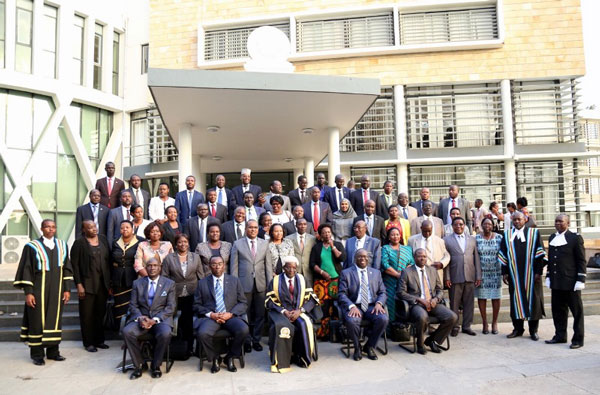
Arusha, Tanzania | THE INDEPENDENT | The East African Community Secretariat and the EAC legislative assembly EALA are seeking for solutions to the misunderstandings between them that currently seek to disrupt the newly passed budget.
After the passing of the budget, the parliamentarians expressed concern that their decisions are disregarded by the Secretariat, which then affects the implementation of the budget and other resolutions passed.
The 2022/23 EAC Budget amounts to 91.5 million dollars, slightly down from the outgoing budget of 91.7 million dollars.
This also raised queries from some members of the house who are concerned that the budget values have steadily declined over the years. This is from the highs of 2016/17 when the budget grew from 100 million dollars to 110 million dollars the following year, before falling to 97 million in 2020/21.
From that outlook, the admission of South Sudan as the sixth member of the community has not had a positive impact on the budget, which is currently almost 25 million dollars lower today than at the time Juba was admitted. The country itself is in arrears of more than 25 million dollars.
South Sudan President Salva Kiir told the last Heads of States Summit that they plan to resume their remittances after next year’s election which will be the climax of the implementation of the South Sudan Comprehensive Peace Agreement.
Uganda’s representative Rose Akol questioned what has happened to the ‘Alternative Financing Mechanism’ that was proposed as long ago as last year, and why the community should continue including South Sudan in the budgeting process.
During the plenary session to pass the budget, the Budget Committee reported that the budget performance for the last two years has been at 37 percent due to lack of enough funds.
The proposed alternative financing mechanism would see countries contribute according to their economy sizes as estimated by the World Bank. However, while most countries seem to agree with a discussion of this model, Kenya, the largest of the economies, is opposed to it.
The country proposes that that can only work if it followed the European Union system where the largest monetary contributor also has a bigger vote than the others, unlike in the EAC where each country has one and equal voice.
Uganda’s George Stephen Odongo is opposed to Kenya’s ideas of the EU model that allows beneficial contribution to the integration process depending on the amount of financial contribution, saying that this would violate EAC the pillar of equality.
They MPs said that if the EAC Secretariat and the EAC Council of Ministers who handle the earlier stages of the process, are not going to increase the budget, they should then ensure that they make no reductions. Tanzania’s Fatuma Ali Ibrahim expressed concern at the reducing EAC budget and the exclusion of some activities from funding next year, saying it spells a bad future for the community.
Uganda’s James Kakooza warned that for example, reducing the budget for the legislative assembly which lost 2 percent from its outgoing budget, has far-reaching impacts on the whole integration process.
The South Sudan government was also accused of being less concerned about the affairs of the community, especially with the minister for EAC Affairs hardly ever attending the sessions he is supposed to attend. Susan Nakawuki from Uganda says that that is a sign of lack of commitment and threatened to riot next time should the minister fail to attend.
In her response to the calls for the action against South Sudan, Deputy Prime Minister, Rebecca Kadaga who represented the chairman of the Council of Ministers, was of the view that any country which is not contributing to the budget should not be allowed to participate in the activities. She also said that as ministers, they agreed to attend EALA sessions in turns.
According to the EAC treaty, the suspension of a member is possible if the Council of Minister recommends it to the Heads of States and Summit, which will then take the final decision. Article 143 specifically calls for sanctions against a partner state defaulting of financial obligations.
And Article 146(1) says the summit may suspend a partner state from participating in activities of the EAC bloc if that state fails to fulfill fundamental principles and objectives of the treaty, including the failure to meet financial commitments to the community within a period of 18 months.
This is not the first EALA is calling for the suspension of Juba, having attempted the process in 2019.
The lawmakers also attacked the Council of Ministers and the Secretariat accusing them of interfering with the operations of the legislature and generally not respecting the decisions of the house.
These include the budgets which is passed, but significantly not followed, with the secretariat choosing to conduct its own affairs, according to the legislators.
On His part, Tanzania’s Maghembe Ngwaru, called for support of the countries that are struggling, particularly South Sudan and Burundi by seeking alternative financing mechanisms akin to what is done in the EU. He reasons for example, that it is unfair for countries that have less than 12 million people to pay the same as countries have several dozen million people.
Dr. Maghembe also suggests a fuel levy at a percentage so that each country will be able to raise revenues from that level depending of the consumption of fuel in that country.
The parliamentarians were also angered by what they say is disrespect of the house including not listening to their concerns, as well as disregarding budgets passed.
Last year, the sittings of parliament were disrupted as the representatives demanded for more funds, and one of the actions taken was the suspension of the sessions by the secretariat.
Counsel to the Community Dr. Anthony Luyirika Kafumbe came under fire for allowing that to happen as the lawyer of the community, without even seeking any legal guidance.
Kafumbe explained that there was a misunderstanding between the house and other organs at that time, which explanation was rejected by the legislators led by Martin Ngoga, the Speaker.
Uganda’s Denis Mbidde called it incompetence on the side of the secretariat.
The Speaker Ngoga warned Council and the secretariat as a whole that in his time as Speaker, such disrespect will not be tolerated again, saying he wanted to halt the budget debate until an explanation is got.
****
URN
 The Independent Uganda: You get the Truth we Pay the Price
The Independent Uganda: You get the Truth we Pay the Price



